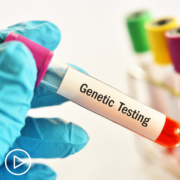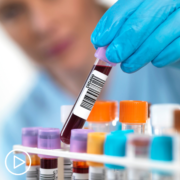Why Should Metastatic Breast Cancer Patients Consider a Clinical Trial?
Why Should Metastatic Breast Cancer Patients Consider a Clinical Trial? from Patient Empowerment Network on Vimeo.
Why should metastatic breast cancer patients consider participating in a clinical trial? Dr. Jane Lowe Meisel discusses when clinical trials may be considered, explains the stages of trials, and shares a valuable resource for patients.
Jane Lowe Meisel, MD is an Associate Professor of Hematology and Medical Oncology at Winship Cancer Institute at Emory University. Learn more about Dr. Meisel here.
See More From INSIST! Metastatic Breast Cancer
Related Resources:

|

|

Metastatic BC Research: How Can You Advocate for the Latest Treatment? |
Transcript:
Katherine:
So, you mentioned earlier, clinical trials. When should patients consider participating in a trial?
Dr. Meisel:
I think it’s a great question and I think the answer is really, almost any time. There are trials in every setting. So, I think one of the common misconceptions about clinical trials is that you really only should be in a clinical trial, or your doctor might only mention a clinical trial if they don’t have other options for you or if you’re really in stage. And I think that perception is changing. But I think the reality is that there are clinical trials in every setting.
So, we have clinical trails looking at prevention of breast cancer. Clinical trials looking to optimize early-stage treatment of breast cancer. Clinical trials looking at secondary prevention, so once you’ve had breast cancer, how can we reduce your risk of recurrence. And then lots of clinical trials in the metastatic setting both for patients who are initially diagnosed with metastatic breast cancer.
And then in second, third, fourth line and even for patients who have had tons and tons of additional therapy that we’re looking at new drugs for. So, I think at almost any juncture where you’re making a treatment change, it’s probably appropriate to say, would there be a clinical trail that you can think of that would be good for me in this setting? And it may be that there’s a one that’s 12 hours away, and it’s not convenient for you or feasible.
And maybe that your doctor doesn’t necessarily know of one but then that prompts them to ask a colleague who may be more involved in clinical trial design and development. Or it may be that there is one, but you ultimately choose not to pursue it because you have a different option. But I think it’s always appropriate to ask, would there be a trail for me? Because if there is, then maybe that opens up an option you hadn’t thought about before.
Katherine:
Sure. For patients who aren’t familiar with the stages of clinical trials, would you give us a brief overview of the stages?
Dr. Meisel:
Yeah. Absolutely. So, in terms of clinical trials that’re being done in humans, we talk about Phase I, Phase II, and Phase III typically. So, a Phase II clinical trial is typically an earlier stage trial.
Looking at either a drug that has not been tested in humans before or a drug that has not been tested in a particular combination in humans before. And so, those trials are done only in select institutions, usually academic institutions as opposed to private hospitals. And they often have what’s called a dose finding phase and then a dose escalation phase. So, the earliest part of those trials is actually looking at, what is the safest dose to give to patients?
So, they start the first patients at a low dose of the compound. And if those patients do well, the next patients that’re enrolled get enrolled at a slightly higher dose. And then up until they reach the highest dose they can find where people are tolerating it and doing reasonably well. And in those Phase I trials, doctors and investigators are also evaluating efficacy, is this drug working. But the primary goal of the early phase trial is actually to find the right dose to then study in larger groups. And so, if they find the right dose and there’s good biological rationale for the compound, then the trial would go on to a Phase II.
Which might be just what we call single arm Phase II study, where every patient is getting that experimental drug. And we monitor them to see, is the drug effective or is it less effective than the standard of care? Or sometimes they’re what we call, randomized Phase II trials where patients are randomized to either get the experimental drug, or to get what the standard of care would be in that situation. I think a lot of people get afraid about the idea of a randomized trial because they’re afraid they’re going to be randomized to a placebo. And that is really not done in the metastatic setting because it wouldn’t be ethical to give a patient with active cancer a placebo.
So, usually the randomization would be either to the study compound or to a standard of care drug. And then if things look good in a Phase II trial, then a Phase III study is done which is usually what the FDA requires to allow a drug to go on and be administered outside of a study for approval. And those Phase III trials tend to be larger studies that’re done in larger groups of patients with more statistical validity because of their size, to determine, is this drug really better than the standard.
Managing Metastatic Breast Cancer Symptoms
Managing Metastatic Breast Cancer Symptoms from Patient Empowerment Network on Vimeo.
Metastatic breast cancer symptom management relies on monitoring a number of factors, including patient and doctor communication. Dr. Jane Lowe Meisel shares advice for optimal management of MBC symptoms and how a supportive oncology team can help.
Jane Lowe Meisel, MD is an Associate Professor of Hematology and Medical Oncology at Winship Cancer Institute at Emory University. Learn more about Dr. Meisel here.
See More From INSIST! Metastatic Breast Cancer
Related Resources:

Which Metastatic Breast Cancer Treatment Is Right for You? Guide |

Factors That Guide a Metastatic Breast Cancer Treatment Decision |

|
Transcript:
Katherine:
How does symptom management play into the treatment decision?
Dr. Meisel:
I think symptom management is huge, because like I said and I tell this to all my patients at the outset of treatment that most of the time, metastatic breast cancer becomes a chronic diagnosis for a patient. You’re dealing with it, essentially like a chronic illness for the rest of your life. And you’re on some form of treatment for the most part, for the foreseeable future.
And so, making sure quality of life is as good as it can be is critically important. And I think symptom management is a huge part of that and we know that if we can treat and manage symptoms well, people can live better and often live longer because then they can stay on treatment for more extensive periods of time comfortably. And so, I always encourage patients, don’t be a martyr.
Don’t think you have to just bounce in here and tell me everything’s okay if it’s not okay. If you’re having symptoms and side effects from treatment, or from the cancer, I want to know about them so that we can really aggressively manage those symptoms just like we’re aggressively managing the cancer. A lot of times oncologists can do that on their own. We are pretty well versed in managing a lot of symptoms and side effects.
But a lot of times also, there are teams of doctors either who do palliative care or here at Emory, we call it supportive oncology where they are specially trained in things like pain management and managing more common side effects like nausea, constipation, diarrhea, appetite suppression, that can go along with cancer and with treatment.
And then they often will co-manage patients with us as well, just to make sure there’s that really strong focus on maintaining as much of a low symptom burden as possible.
Key Considerations When Making Metastatic Breast Cancer Treatment Decisions
Key Considerations When Making Metastatic Breast Cancer Treatment Decisions from Patient Empowerment Network on Vimeo.
Making metastatic breast cancer treatment decisions involves weighing key factors. Dr. Jane Lowe Meisel shares important considerations that aid in choosing the best treatment for an individual patient.
Jane Lowe Meisel, MD is an Associate Professor of Hematology and Medical Oncology at Winship Cancer Institute at Emory University. Learn more about Dr. Meisel here.
See More From INSIST! Metastatic Breast Cancer
Related Resources:

Which Metastatic Breast Cancer Treatment Is Right for You? Guide |

Factors That Guide a Metastatic Breast Cancer Treatment Decision |

|
Transcript:
Katherine:
Yeah. Yeah. So, what factors are considered when deciding on the best treatment approach for an individual patient?
Dr. Meisel:
So, I think certainly the tumor type that we were talking about. Is it estrogen-positive or HER2-negative or HER2-positive?
I think response to past treatments, both in terms of if someone has had metastatic disease for a long time and has had a few treatments already, how long did they respond to those treatments and how completely did they respond to those treatments?
Did they have stable disease for a while, or did their cancer actively shrink?
And then I think other than that, it would be some of the things I touched on. Side effect profiles. Do patients have pre-existing neuropathy from other chemotherapy? If so, maybe you want to avoid a regimen that causes more neuropathy. Schedule. Some patients, it’s really important to be on a certain schedule, as opposed to a different schedule. I think whether there are clinical trials available instead of whatever the standard of care regimen would be is also important.
Because for some patients who are interested in pushing the envelope or who might be a great candidate for a particular trial, if there is one that they’re a candidate for that’s not horribly inconvenient from a logistics standpoint, then trials I think are also a great option to consider. So, I think from an effectiveness standpoint, you want to think about the tumor type response to past treatments. And then potentially, if the patient has had, what we call genomic profiling, where the tumor has been sent for basically genomic analysis, to see what genes might be mutated in the tumor that could potentially drive a response to a newer, different therapy.
All those things can be taken into account as we think about the cancer. But then there are the patient-specific factors, and I think those would be mainly side effects, schedule, clinical trials and desire or not to pursue those. And then, just what the patient’s perspective is on the plan that you’re offering them.
What is Metastatic Breast Cancer and How Is It Diagnosed?
What is Metastatic Breast Cancer and How Is It Diagnosed? from Patient Empowerment Network on Vimeo.
Metastatic breast cancer (MBC) may progress differently than the earlier stages of breast cancer. Dr. Jane Lowe Meisel defines metastatic breast cancer and discusses key tests involved in an MBC diagnosis.
Jane Lowe Meisel, MD is an Associate Professor of Hematology and Medical Oncology at Winship Cancer Institute at Emory University. Learn more about Dr. Meisel here.
See More From INSIST! Metastatic Breast Cancer
Related Resources:

|

|

|
Transcript:
Katherine:
This webinar is focused on metastatic disease, would you define metastatic breast cancer for us?
Dr. Meisel:
Absolutely. And I think metastatic breast cancer is one of those terms that as doctors, we throw around a lot and often times don’t stop to check understanding as to what that means.
And what metastatic breast cancer is and means, is breast cancer that is spread outside of the breast and surrounding lymph nodes to another organ system. So, metastatic breast cancer, some of the most common places where it spreads are to the bone, to the skin, to the lungs, to the liver, to the brain. There are other places it can spread to. I’ve seen it on the ovaries, in the GI tract. But basically, when breast cancer spreads outside of the breast and surrounding lymph nodes to another organ system, that’s when we consider it metastatic.
Katherine:
How can a patient ensure they are getting an accurate diagnosis?
Dr. Meisel:
Another good question. And I think the most important thing when you’re considering whether or not you have a diagnosis of metastatic breast cancer is to get a biopsy of that metastatic site. So, you wouldn’t want to assume, just based on a CT scan that shows something in the bone that you have metastatic disease. Ideally, we would biopsy that spot or some spot that was indicative of metastatic disease to actually prove that there is metastatic cancer in that distant site.
Because sometimes it’s nothing. Sometimes you get scans and a little bone abnormality, maybe a scar from a prior fall. And then also, sometimes if it is metastatic, sometimes the breast cancer, the hormone receptor status for example can change from the primary site to the metastatic site. And that might impact treatment. So, it’s important to both get a metastatic biopsy to confirm diagnosis. And also, to understand what the treatment plan might be. And I think also for patients, just to make sure that you understand what your stage is, ask your doctor.
Say, what is my stage? Because sometimes doctors think people understand and they don’t actually, so checking that understanding is important. But if your doctor or provider is not actively checking your understanding, you can check it with them to make sure that if you are metastatic or have Stage IV disease, which is another way we define metastatic or talk about metastatic cancer, that you make sure you have the definition right.
Katherine:
Right, right. So, once someone has been diagnosed with metastatic disease, are there key tests that’re used to help understand how their disease may behave and progress?
Dr. Meisel:
Absolutely. So, I think the first thing as I said is that metastatic biopsy. Another thing that’s very important is understanding the hormone receptor status and the HER2 status of the breast cancer. And probably for a lot of you listening, if you have listened to metastatic breast cancer webinars before or maybe know someone or have had a diagnosis yourself, you’re well versed in this. But for some who may not be, I think a quick overview is maybe helpful. Breast cancer can be divided into three different subtypes. So, triple-negative, estrogen-positive or HER2-positive. And estrogen-positive breast cancer is the most common kind.
That tends to be driven by hormones and often treated with what we call, endocrine therapy. So, anti-estrogen pills, things like Tamoxifen or aromatase inhibitors are examples of that. And that’s one kind. And then there’s HER2-positive breast cancer, which is a type of breast cancer that over expresses a marker called HER2. And we now, since we know about that marker, have been able to develop a lot of different treatments that target HER2 selectively.
And can be used to treat that subtype. And then triple-negative is basically estrogen-negative, progesterone-negative and HER2-negative. And that type of breast cancer traditionally was treated essentially only with chemotherapy. But now we’ve had some breakthroughs, which we’ll talk about I think later in this program talking about immunotherapy and more targeted therapy for that. But those subtypes help determine how we treat patients. And it also can sometimes predict behavior.
I would say one of the other things that helps us predict behavior of metastatic disease is, if a patient had early-stage disease before, how quickly they developed metastatic disease. So, for example, someone who develops estrogen-positive metastatic breast cancer 12 years out from their original diagnosis is statistically more likely to have a slower progressing course of disease than someone who develops triple-negative metastatic disease very soon after their initial treatment. So, I would say that’s the primary thing we look at in terms of determining treatment plan and then predicting overall course.
What Metastatic Breast Cancer Patients Should Know About Treatment and Research
What Metastatic Breast Cancer Patients Should Know About Treatment and Research from Patient Empowerment Network on Vimeo.
What do metastatic breast cancer patients need to know about treatment and research? Dr. Jane Lowe Meisel shares updates and recommends resources for staying abreast of research news.
Jane Lowe Meisel, MD is an Associate Professor of Hematology and Medical Oncology at Winship Cancer Institute at Emory University. Learn more about Dr. Meisel here.
See More From INSIST! Metastatic Breast Cancer
Related Resources:

|

Metastatic BC Research: How Can You Advocate for the Latest Treatment? |

What Could Metastatic Breast Cancer Genetic Testing Advances Mean for You? |
Transcript:
Katherine:
So, let’s start by discussing the latest developments in treatment and research updates. Are there recent developments you feel breast cancer patients should know about?
Dr. Meisel:
Absolutely and I think it’s really been such a remarkable time because even during COVID, a pandemic, where I think a lot of people worried that research efforts would shut down or stall. We’ve still seen the approval of a number of drugs in the past year that’ve really already markedly changed lives. And a lot of important findings that’ve come out of other trials that they have opportunity to do that as well.
I think some of the biggest information that was presented at our most recent large meeting, which was the American Society of Clinical Oncology, or ASCO National Meeting in 2021, were a few things that pertain to the metastatic breast cancer population. One was two studies, the PALOMA-3 Trial and the MONALEESA-3 Trial, which looked at a class of drugs called CDK4-6 inhibitors along with anti-estrogen pills in metastatic estrogen-positive breast cancer.
And really confirm for patients that not only do these drugs improve the amount of time that people can stay on treatment before their cancer progresses, but actually improve how long people live. Even when they’re used very, very early on in treatment, they impact survival down the line for many, many years. So, it really confirms for physicians like me that this class of drugs should be used as the standard of care and first line for patients with estrogen-positive stage IV breast cancer, and I think that’s important for patients to know. Along those lines, there’s a drug called sacituzumab govitecan, or Trodelvy, which is a much easier to say name.
Katherine:
Yes.
Dr. Meisel:
A new antibody drug conjugate in triple-negative metastatic breast cancer. And we’ve also seen, since this drug was approved last year, it has markedly changed the lives of many patients with triple negative disease. And the study called the ascent trial, which is what led to that drug’s approval was studied further and some of these additional results presented at ASCO this year.
And found that this drug not only improves again, how long people get before they have to move on to another treatment, but actually improves how long people live as well, even when given later on in the course of therapy. So again, really encouraging use especially in triple-negative metastatic disease, which is hard to treat. And I think another study that’s really worth patients and doctors taking a hard look at, was actually a study that looked at patient outcomes and patient experience. This is a study that actually talked with metastatic patients and gathered their views on treatment related adverse effects.
Talked to patients about what adverse effects they were experiencing from drugs. How they managed those adverse effects. And found that most patients, over 90 percent, will be willing to talk about reducing the dose of drugs or changing dosing schedules, in order to improve quality of life. And I think that’s really important because a lot of times, the doses of drugs that get approved are the doses that are the highest doses that don’t cause extreme toxicity. But sometimes people can have effective, really good outcomes on lower doses and have much better quality of life.
And in metastatic breast cancer where really the goal often times is to help people live as long as they can, but also as importantly, as well as they can, be able to have those open-ended conversations between patients and doctors about what’s really impacting your quality of life now and how can we make that better is important. And this study I think really highlighted that both for patients and physicians, how important that back and forth is to having a successful outcome. Both in terms of how life is lived, but in terms of quality of that life.
Katherine:
Right. Right. How can patients stay up to date on developing research?
Dr. Meisel:
It’s so interesting because there is so much coming out and I think it can be hard to figure out what Phase I study that looks exciting is really going to become something, versus what really could be important in my treatment today. And what I always tell people is actually, the NCI website. So, the national cancer institute, has a phenomenal page looking at advances in breast cancer research. So, if you Google NCI advances in breast cancer research, there’s a great page that comes up. And it’s impressively up to date and I think very patient friendly.
Breaks things down into early stage and metastatic and then in the metastatic section, talks about estrogen-positive, HER2-positive, triple-negative, which we can talk about more today but are the three big subtype of metastatic disease that dictate how we treat them. And then have links to all the different research updates and talk about what these drugs are, what the classes are and what the settings are in which they’re studies.
And so, I think that’s a really great first stop and then the links can take you to all different stuff that’s on the page that you might want to look into more in depth. And then also, the Breast Cancer Research Foundation, which is a phenomenal organization. They have a great website, too and if you click around on the website, you can see not only who they’ve donated money to that’s doing promising research, they also have podcasts, they have a blog with science and research news. I think that’s a really great site for patients to use to stay updated.
Metastatic Breast Cancer Survivor: Taking Control of Your Quality of Life
Metastatic Breast Cancer Survivor: Taking Control of Your Quality of Life from Patient Empowerment Network on Vimeo.
Stage IV metastatic breast cancer survivor Lesley shares her story of taking control of her care. After her oncologist chose aggressive treatment that would include 8 rounds of chemo, bi-lateral mastectomy, and radiation, she experienced a severe emotional toll along with extreme nausea, fatigue, bone aches, low blood counts, neutropenia, gasping for breath, and then sepsis. After receiving an emotional response when asking for a second opinion, Lesley was able to get an appointment with another oncologist, took control of her own life, and decided to stop treatment until she achieved her goal of climbing Mt. Whitney. And after summiting the mountain, she chose a new treatment with her oncologist based on side effects and quality of life.
Lesley’s advice,
“We have this one life, let’s live it to the best of our ability. These actions are key to staying on your path to empowerment.”
See More From the Best Care No Matter Where You Live Program
Transcript:
My name is Lesley. I live in the Rogue Valley in Southern Oregon. In 2013, I was diagnosed with stage IV metastatic breast cancer.
During a monthly self-check, I noticed a lump in my right breast. I went to the primary care doctor who swiftly ordered a mammogram, ultrasound and a biopsy. Shortly after I met with an oncologist and to my surprise, I was immediately provided with a treatment plan of: 8 rounds of chemo, a bi-lateral mastectomy and radiation.
The side effects of initial treatment literally knocked me off my feet. I was plagued by extreme nausea, fatigue, bone aches, and low blood counts which resulted in daily shots for neutropenia. I would wake up in the middle of the night gasping for breath.
A few weeks into treatment, I was admitted into the hospital with sepsis. The port-a-cath site was infected and my family and I specifically asked for it to be removed. However, my care team was exclusively focused on saving the port-a-cath because of future chemo treatments I would need.
The side effects snowballed which really scared my family. I recall my husband yelling and asking why someone wasn’t doing anything to help me. My situation was dire and we felt no one was listening to the emotional toll of the treatment. Rashes as well as swelling, engulfed my body, and I felt at this point, it was not the cancer that was killing me, it was the treatment plan that the doctors set forth, and my body was rejecting anything and everything put into it, and yet again, the oncologist wanted me to start another round of chemo.
I knew that things had to change. I soon took matters into my own hands. I told my oncologist that I would not go back onto chemo, however, I pushed for additional treatment options. When I told her I was going to get a second opinion, she was upset with me and asked me to meet with her colleague. I told her I would not meet with another oncologist from the same practice.
I was referred to an orthopedic surgeon who was doing my bone biopsy and within one hour of meeting me and hearing my story, he suggested a second opinion doctor. He picked up his cellphone, called her right from the examining room and within a matter of time had already set up an appointment for me. I later had a successful breast sparing lumpectomy instead of a mastectomy. My new care team was extremely thorough, but also respectful of me and the quality of life I desired.
With a grip on my treatment path, I decided to start taking my life back and I began hiking. My goal for the year was to train for 8 months and summit Mt. Whitney. I met with my oncologist and told her I wanted to stop treatment until after my big climb. We did stop treatment and shortly after, I summited Mt. Whitney.
Several weeks later, I met with my oncologist and started another regimen, of which I chose as well with guidance from my oncologist. I progressed in 2018, again I also decided which treatment option I wanted to do, based on my quality of life, and the side effects I was willing to live with.
My advice to other metastatic breast cancer patients:
- Find your voice, you have one
- Take full control of your care at the outset
- Feel empowered to question your care team at any point on your journey
- Decide on the quality of life YOU want to have
- Don’t be afraid to get a second opinion
Since my diagnosis, I’ve made it my mission to advocate for my metastatic breast cancer community. Patient advocacy is my full time job. I share my story to inspire and empower others to take control of one’s care.
My best advice is to find and build a care team that sees you not as a number in a queue of patients, but as the person whose life is represented in that medical file. We have this one life, let’s live it to the best of our ability.
These actions are key to staying on your path to empowerment.
What Factors Help Guide Metastatic Breast Cancer Treatment Decisions?
What Factors Help Guide Metastatic Breast Cancer Treatment Decisions? from Patient Empowerment Network on Vimeo.
What treatment is best for your metastatic breast cancer? Dr. Halle Moore of Cleveland Clinic reviews important considerations when choosing a therapy, including the role of molecular testing.
Dr. Halle Moore is Director of Medical Breast Oncology at the Cleveland Clinic. Learn more about Dr. Moore, here.
See More From Engage Breast Cancer
Related Programs:

COVID-19 Vaccination: What Do Breast Cancer Patients Need to Know? |

|

Metastatic Breast Cancer Treatment Decisions: Which Path is Best for You? |
Transcript
Dr. Halle Moore:
For patients with advanced breast cancer, some of the major factors that affect our treatment decisions are first the receptor results. This includes the ER and PR, which are the hormone receptors, as well as HER2. These receptors really guide the initial treatment options.
In addition, the patient’s overall health status is an important factor in treatment decisions. And then the prior treatment history, what the patient has previously received, either in an earlier stage of disease or previously for their advanced cancer.
Molecular testing for metastatic breast has gone from something that was primarily used only in the research setting to something that is now quite valuable in making treatment decisions every day in the clinic.
The results of molecular testing may indicate whether our patients are eligible to receive certain treatments, such as immunotherapy or certain targeted cancer treatments. We also have an increasing number of clinical trials that are testing treatments targeted to the molecular drivers of an individual’s cancer.
I would say one of the most interesting new approaches in the treatment of metastatic breast cancer is the use of antibody drug conjugates. These combine an antibody against a target that’s likely to be present on cancer cells more so than on normal cells in the body.
And, typically, a very potent chemotherapy drug is combined with the antibody. The antibody then allows for delivery of a high concentration of this chemotherapy drug preferentially to the cancer cells allowing for very effective treatment of the cancer while limiting toxicity from the treatment to the rest of the body.
Metastatic BC Research: How Can You Advocate for the Latest Treatment?
Metastatic BC Research: How Can You Advocate for the Latest Treatment? from Patient Empowerment Network on Vimeo.
What do metastatic breast cancer patients need to know about the latest research news? Dr. Megan Kruse shares highlights from the 2020 San Antonio Breast Cancer Symposium (SABCS), along with her advice for advocating for the right testing to help guide treatment options.
Dr. Megan Kruse is a Breast Medical Oncologist at the Cleveland Clinic. More about this expert here.
See More From INSIST! Metastatic Breast Cancer
Related Resources:

|

|

Factors That Guide a Metastatic Breast Cancer Treatment Decision |
Transcript:
Dr. Kruse:
At this year’s San Antonio Breast Cancer Symposium, there were a few interesting presentations about the treatment of first-line metastatic triple-negative breast cancer that I think patients should be aware of.
Two of the presentations centered around trials that were presented in the past. Those reporting, patients reported outcomes from the IMpassion 130 study, which looked at chemotherapy for metastatic triple-negative disease plus the immunotherapy atezolizumab. And then, there was also an update on the results from the KEYNOTE-355 study, which was a study again of chemotherapy for metastatic triple-negative patients in combination with pembrolizumab, a different immunotherapy. And both of these studies showed that there was benefit for women in certain sub-groups of triple-negative breast cancer when looking at addition of immunotherapy.
And so, what I’d like to draw patients’ attention to with these presentations is that you have to be aware of if you fall into one of these categories so you know if you’re a candidate for the particular type of immunotherapy that can be added to chemotherapy. There are two different ways to test for if a patient is a candidate for immunotherapy and they are both tests that can be done on biopsies of metastatic or cancer recurrent sites in the body.
They can also be sent off of original breast cancer tumors. And what we now know is that for patients who do not have markers that suggest immune activation or where the immune system would be responsive to immunotherapy the addition of that extra therapy really does not help to improve cancer control over chemotherapy alone. And I think that’s a really important topic because everyone is very interested in immunotherapy, but it does have side effects of its own and it can actually be lasting side effects in terms of inflammation in organs like the liver, the colon, and the lungs.
And then, the third presentation that I’d like to bring up is the IPATunity study, which looked at the addition of a targeted therapy called ipatasertib to, again, chemotherapy for the first treatment of metastatic triple-negative disease.
And so, this is getting into an area of targeted therapy for metastatic triple-negative disease. And again, only looks at patients that have a particular marker that suggests sensitivity to this drug. And those are certain genetic markers, predominately changes in a DNA marker called PIK3CA. In this study, we actually found that there was no benefit for the targeted therapy added to chemotherapy for patients that had that genetic mutation, which was different than what was seen in earlier studies of the same combination. So, I think there’s more work to be done and it’s probably too early to say that this targeted therapy will not be used in treatment of metastatic breast cancer.
But what all of these research studies show together is that metastatic triple-negative cancer is not really just one disease. It’s very clear that within that one name, there are multiple different patient types and tumor types that need to be cared for differently.
And so, again, I think the theme from these abstracts and these research presentations is that we have to look into the right therapy for the right patient at the right time, which largely involved DNA-based testing.
So, when patients are thinking about their treatment options and how to best help with their providers about what treatment options exist for them, I think it’s important to recognize the type of testing that may be advantageous in your cancer type.
And so, for all metastatic breast cancer patients, we really recommend that they’ve had genetic testing to look for DNA changes like BRCA mutations that will lead to treatment options. For metastatic triple-negative disease, it’s important to make sure that you’re providers are testing for PDL1, which would make you a candidate for immunotherapy. And then, the more we learn about clinical trials, the more we have options for patients that have had drug-based DNA or genome-based testing. So, that’s an important term for patients to become familiar with is genomic testing.
And I think when you bring that up with your providers, they’ll know what you’re talking about and they’ll know that what you’re potentially interested in is new targeted therapy for the cancer that may either come in combination with chemotherapy or as a standalone treatment option. If you don’t have those options that are available, and FDA approved basis for regular routine patient care, there is always the option of clinical trials.
And so, if that is something that you’re interested in, genomic testing will often open the way. So, I think as you’re writing notes when you’re talking to your providers, you might wanna jot down whether or not you’ve had genetic testing and whether or not you’ve had genomic testing in the past, as both of those things will help potentially address all of your treatment options.
I’ve very hopeful about the research that is going to lead to new developments for breast cancer treatment in the next few years.
I think what we’ve seen both at this San Antonio Breast Cancer Symposium as well as other conferences in the recent past has been a lot of focus on finding the right treatment for the right patient at the right time. And so, patients seem to be very interested in finding out this information. They often come to clinic armed with the most recent data, which allows their providers to have really informed discussions about what the best treatment might be. And to talk about if the new treatments are not great right now, what treatments might look like in the future.
I think the other thing that’s encouraging about the research that we’ve seen presented at this conference is that some of these trials are very, very large. For example, the RxPONDER trial was a trial of over 9,000 patients. And I really think that’s amazing to get that many patients interested in research that may not directly impact their patient care but will impact the care of others moving forward.
It’s just a sign that our breast cancer patients are empowered, and they want to make a difference in the scientific community as a whole.
Essential Testing Following A Metastatic Breast Cancer Diagnosis
Essential Testing Following a Metastatic Breast Cancer Diagnosis from Patient Empowerment Network on Vimeo.
Following a metastatic breast cancer diagnosis, what tests are essential? Dr. Lisa Flaum reviews the role of key tests, and the impact of molecular (genetic) test results on treatment decisions.
Dr. Lisa Flaum is a Medical Oncologist at the Robert H. Lurie Comprehensive Cancer Center of Northwestern University. Learn more here.
See More From INSIST! Metastatic Breast Cancer
Related Resources:

|

|

|
Transcript:
Dr. Flaum:
When someone has either a diagnosis or a suspected diagnosis of metastatic cancer, meaning a diagnosis of cancer that has spread somewhere outside of the breast. And the most important initial step is establishing a tissue diagnosis. So, we could have our suspicions based on imaging, based on symptoms, but the most important thing is to confirm it. And usually that confirmation involves some type of tissue biopsy. So, collecting cells, examining them under the microscope, making sure that the diagnosis in fact, is cancer. Making sure that the cancer has spread from the breast, which is something that is definable under the microscope for the most part. And then evaluating various molecular markers within the tumor itself that are critical to guiding treatment.
So, in addition to the tissue diagnosis, the other important first step is what we call cancer staging. So, establishing the extent of the tumor within the body, which typically involves some type of scans, which may be variable depending on the situation or depending on the physician often could be a CT scan and a bone scan, maybe a PET scan. There may be an MRI.
So, a number of different tests that help us establish where the tumor is at baseline, so we can better understand the anatomy, but also to follow down the road to establish whether any given treatment is working. There are also maybe discussions of other types of molecular testing beyond what we determined in terms of the traditional biologic markers. You might hear the terms next generation sequencing tests like Foundation, Guardant, Tempus, which better define the cancer’s biology, which increasingly is becoming useful in terms of targeting treatment to someone’s specific cancer.
So, the molecular tests are looking at a few different things. So, first and foremost from a breast cancer standpoint, the most important basic molecular markers are what we consider to be the four main receptors, which is the estrogen and progesterone receptor, which dictates whether a given tumor is driven by estrogen and importantly dictates whether anti-estrogen therapy is going to be an appropriate component of the treatment. The other basic marker is called HER2, which is a protein that’s over-expressed.
In about 20% of breast cancer patient cells, and it’s also very critical in terms of guiding treatment. For specific types of breast cancer, once we know those preliminary molecular markers, then there’s an array of other types of anomalies within the tumor itself that could help to guide specific treatment. So, a couple of examples, and I can talk about that when you talk about treatment. If someone has a genetic predisposition to breast cancer with a BRCA mutation, there’s a specific treatment that might be appropriate. More recently, there’s another abnormality that can be detected by these tests called a PI3-Kinase mutation that identifies a population of patients who could be appropriate for another type of targeted therapy. So, for an individual, knowing what their particular profile is, whether or not those treatments are going to be indicated right at the beginning of treatment or maybe something that we use down the road. Inevitably, they’re going to help us understand what our tools are when we’re helping to make those decisions.
Factors That Guide a Metastatic Breast Cancer Treatment Decision
Factors that Guide a Metastatic Breast Cancer Treatment Decision from Patient Empowerment Network on Vimeo.
Dr. Julie Gralow discusses factors that affect metastatic breast cancer treatment decisions, including the cancer’s biology, the overall health of the patient, and treatment side effects.
Dr. Julie Gralow is the Jill Bennett Endowed Professor of Breast Medical Oncology at the University of Washington, Fred Hutchinson Cancer Research Center, and the Seattle Cancer Care Alliance. More about this expert here.
See More From INSIST! Metastatic Breast Cancer
Related Resources:

What Could Metastatic Breast Cancer Genetic Testing Advances Mean for You? |

What Are Essential Genetic Tests for Metastatic Breast Cancer Patients? |

|
Transcript:
Katherine:
Well, Dr. Gralow, what other factors should be taken into consideration with a treatment route?
Dr. Gralow:
I always like to think of the treatment decision as relying on three factors, and the first relates to the tumor factor, the cancer factor.
So, we talked a lot about the biology, the estrogen receptor, the HER2, the genomic profiling. So, that’s critical, but there are two other components that we need to really strongly consider when trying to devise the right treatment regimen. One of those is patient factors, and not just the patient’s genetics, but are they pre- or post-menopausal?
What is the age? Where are they in life? Are they young with young kids? Are they working, and is that an important priority for them? Are they older and with grandchildren, and they don’t need to work? What is it that would be critical? What are the patient’s priorities here, and what are their fears, what are the things they would – what would be really important as we plan a regimen? And so, the patient factors which would be patient priorities and where they are in life right now.
And then, there’s factors related to the treatment itself, which would include not just how effective it is, but – and, this is really important when trying to decide regimens – what are the side effects of a regimen? For some patients, hair loss is a big deal, and we can put it off as long as possible – maybe choosing the first couple regimens don’t cause hair loss sometimes.
But, for other people, that doesn’t matter to them. For some, we have oral – some regimens, and that could keep them out of the infusion room, and others actually – I’ve had patients who actually like coming into the infusion room regularly so that they can review the side effects and get the reassurance provided by it. So, we’ve got different route of administration of the drugs, different side effects. If you already had, for example, a neuropathy – a numbness/tingling of fingers and toes – from treatment that you might have gotten for early-stage disease, we’d probably want to avoid drugs where that’s their major side effect in the metastatic setting and that would increase that even further.
We’ve got some drugs that cause a lot of toxicity to our GI system – nausea, vomiting, or diarrhea – and other drugs that don’t. And so, understanding what symptoms the patient already has and actually tailoring the treatment based on some of the side effects of the drug could also be done, as well as how they’re administered. So, again, patient factors, tumor factors, and then, factors related to the treatment itself all come into play when we make decisions.
Katherine:
There have been so many advances in breast cancer research. What are you excited about in research right now?
Dr. Gralow:
Well, every single drug that’s been approved, every single new regimen that’s been approved in breast cancer is the direct result of clinical trials, and this is a major part of my career, is to help patients get access to clinical trials and run important clinical trials that could lead to new discoveries – is this regimen better? What’s the toxicity?
Because until we have a cure for breast cancer, we need to do better, and we need to research better treatment options. So, doing trials, having access to clinical trials where you can participate, help move the science forward is key.
I think where we’re moving with breast cancer is the more we’re understanding the patient and the tumor, the more we’re realizing every single breast cancer is different, actually, and whereas when I started my training 20-plus years ago, breast cancer was breast cancer – we weren’t even using HER2 yet, we were just learning how to use estrogen receptor, and we kind of treated everything the same – now, we’re subsetting, and subsetting, and subsetting. Even in triple negative breast cancer now, which is about 18-20% of breast cancer, we’re subsetting.
Does that triple negative breast cancer have PD-L1, which is associated with being able to get immunotherapy drugs? Does it express androgen receptor? Because sometimes, even a breast cancer that doesn’t have estrogen or progesterone receptor can express the androgen receptor, like prostate cancer, and we can use some prostate cancer drugs. So, even triple negative breast cancer we’re subsetting and subsetting, and could that triple negative breast cancer be associated with a BRCA1 or 2 mutation, and then we can use the PARP inhibitors?
So, I’m actually really excited about that we’re learning more and more, and subsetting, and not treating breast cancer as one size fits all, and if we can better tailor the treatments to the patient and the tumor, that we are going to get to the point where I can tell my patients yes, we can get cures in metastatic breast cancer.
Metastatic Breast Cancer: Debunking Common Misconceptions
Metastatic Breast Cancer: Debunking Common Misconceptions from Patient Empowerment Network on Vimeo.
Dr. Julie Gralow debunks common misconceptions about metastatic breast cancer, including the metastatic diagnosis itself and why genetic tests are important.
Dr. Julie Gralow is the Jill Bennett Endowed Professor of Breast Medical Oncology at the University of Washington, Fred Hutchinson Cancer Research Center, and the Seattle Cancer Care Alliance. More about this expert here.
See More From INSIST! Metastatic Breast Cancer
Related Resources:
Transcript:
Katherine:
All right. Dr. Gralow, when you meet with patients, what are some of the more common misconceptions that you hear related to diagnosis?
Dr. Gralow:
Well, I think people do confuse – especially at an early diagnosis – that the metastases, the travel to the local lymph nodes, is not the same as a metastatic breast cancer, so we spend some time talking about how it’s still curable and not considered a distant metastasis if the lymph nodes are in the armpit or up above the collarbone, and so, that’s something that we spend some time talking about.
This whole term of “metastatic recurrence” – unfortunately, when you start looking online and get your information from Dr. Google, you read right away that it’s no longer curable, and in 2020, yes, that’s true. That’s probably the most specific statement that we can make. We are not going with curative intent, which means we treat for a defined amount of time, and then all the disease goes away, and we stop treatment, and then you go on with your life, and it never comes back. That would be cure.
But, I think it’s really important to point out that much of metastatic breast cancer can be highly treatable, and what we hope to do – and certainly, at least a subset of metastatic breast cancer – we want to convert it more to what we would call a chronic disease, and so, think of it more like hypertension, high blood pressure, or diabetes. These are diseases that we generally don’t cure with treatment, but that we can control with drug therapy, which sometimes has to be adjusted, and if we don’t control it, we can get some bad complications.
So, that’s not all metastatic breast cancer, unfortunately – we can’t convert all of it to something where we can use a therapy for a long time that keeps it in check and where you have a pretty good quality of life – but we’re hoping that more and more, we’re getting targeted therapies and more specific treatments to patients so that we can convert more patients to a more chronic kind of situation.
Metastatic Breast Cancer Staging: What Patients Should Know
Metastatic Breast Cancer Staging: What Patients Should Know from Patient Empowerment Network on Vimeo.
Breast cancer expert Dr. Julie Gralow discusses metastatic breast cancer staging, including prognostic staging, breast cancer subtypes, and the meaning of metastasis.
Dr. Julie Gralow is the Jill Bennett Endowed Professor of Breast Medical Oncology at the University of Washington, Fred Hutchinson Cancer Research Center, and the Seattle Cancer Care Alliance. More about this expert here.
See More From INSIST! Metastatic Breast Cancer
Related Resources:

What Are Essential Genetic Tests for Metastatic Breast Cancer Patients? |

|

What Could Metastatic Breast Cancer Genetic Testing Advances Mean for You? |
Transcript:
Dr. Gralow:
The staging of breast cancer has traditionally been by something we call anatomic staging, which has the tumor size, the number of local lymph nodes involved, and whether it has metastasized beyond the lymph nodes. So, that’s TNM – tumor, nodes, metastases. And so, that’s the classic staging, and based on combinations of those things, you can be a Stage 0 through Stage 4. Stage 0 is reserved for ductal carcinoma in situ, which is a noninvasive breast cancer that can’t generally spread beyond the breast, so that’s Stage 0, and then we go up for invasive cancer.
Interestingly, just a couple years ago, the big group that oversees the staging of cancers decided that in breast cancer, that TNM – the size, the lymph nodes, and the location beyond the lymph nodes – is not good enough anymore, so they came up with a proposal for what we call a clinical prognostic stage, which is a companion to the traditional TNM staging.
What they were getting at here was it’s not just how big your cancer is, how many lymph nodes, or whatever, it’s also at the biology of your cancer. So, this new clinical prognostic stage takes into account the estrogen and progesterone receptor of your cancer, the HER2 receptor at the grade, which is a degree of aggressiveness, and then, if your tumor qualifies, one of the newer genomic testing profiles that we use in earlier-stage breast cancer, such as the Oncotype DX 21-gene recurrence score or the MammaPrint 70-gene assay.
So, all of that goes into account now, and the whole point here is that the estrogen receptor, the HER2, the grade, and some of these genomics may actually make more difference than how many lymph nodes you have, where the cancer is, and how big it is, so it’s not just the size, but also the biology of the cancer that we’re trying to include in the new staging systems.
Katherine:
In this program, Dr. Gralow, we’re focusing on metastatic breast cancer. Would you explain when breast cancer is considered to have metastasized?
Dr. Gralow:
That’s a great question because technically, if the lymph nodes in the armpit – the axillary area – are involved, that does represent spread beyond the breast, but if it stays in the local lymph node areas, it’s not technically called a metastatic or Stage 4 breast cancer. So, metastatic breast cancer would have traveled beyond the breast and those local lymph nodes, and some common sites would be to the bone, to the lungs, to the liver, less commonly – at least, up front – to the brain, and it could also travel to other lymph node groups beyond those just in the armpit and the local chest wall area as well.
Katherine:
What about subtypes? How are they determined?
Dr. Gralow:
The main way that we subtype breast cancer right now is based on the expression of estrogen and progesterone receptor, the two hormone receptors, and the HER2 receptor, the human epidermal growth factor receptor. So, to date, those are the most important features when we subtype, and so, a tumor can either express estrogen and progesterone receptor or not, and it can overexpress or amplify HER2 or not, and if you think that through, you can come up with four different major subtypes, in a way, based on estrogen receptor positive or negative and HER2 positive or negative.
When all three of those are negative, we call that triple negative breast cancer, and that’s about 18-20% of all breast cancers as diagnosed in the U.S. And then, when all three are positive, we sometimes call it triple positive, and the reason that we subtype is because we know that those different subsets act differently and that we have different drugs to treat them with, and we’ve got great drugs in the categories of hormone receptor positive and HER2 positive, and increasingly, some recently hope in a new drug approval or two in triple negative breast cancer as well.
When Is a Full Mastectomy Appropriate for Metastatic Breast Cancer Patients?
When Is a Full Mastectomy Appropriate for Metastatic Breast Cancer Patients? from Patient Empowerment Network on Vimeo.
Dr. Stephanie Valente discusses mastectomy for metastatic breast cancer patients, including common misconceptions around breast cancer surgery.
Dr. Stephanie Valente is the Director of the Breast Surgery Fellowship Program at Cleveland Clinic. More about this expert here.
See More From INSIST! Metastatic Breast Cancer
Transcript:
Dr. Valente:
So, there are a lot of reasons that a woman undergoes a mastectomy. The first one is choice. So, anytime somebody is diagnosed with breast cancer, they actually have the choice of whether or not they want to remove their whole breast. So, even if their cancer is small, they do have the option of removing the whole breast. If the cancer is smaller, they might have the option to save the breast, which is called a lumpectomy.
Sometimes cancer is found, and it’s a little bit more advanced where saving the breast is not an option. So, the cancer is larger than a lumpectomy would allow. And sometimes that’s what’s called the extent of disease. So, the amount of breast tissue that’s involved requires a majority of the portion of the breast to be removed.
So, just because a woman has breast cancer that’s made its way out of the breast, into the lymph nodes, or beyond – so, metastatic cancer – doesn’t necessarily mean that she needs a mastectomy. So, just because you’ve got metastatic cancer doesn’t necessarily mean that the breast needs to be completely removed.
So, I think that one of the biggest misconceptions is that the more aggressive somebody is with their surgery, the better their chances with survival.
And again, taking a step back and saying you can choose a more aggressive surgery, but a more aggressive surgery doesn’t necessarily mean it gets you out of chemotherapy or it gets you out of radiation therapy. Those things are recommended, independent of a woman’s choice for the type of surgery that she may or may not pick.




